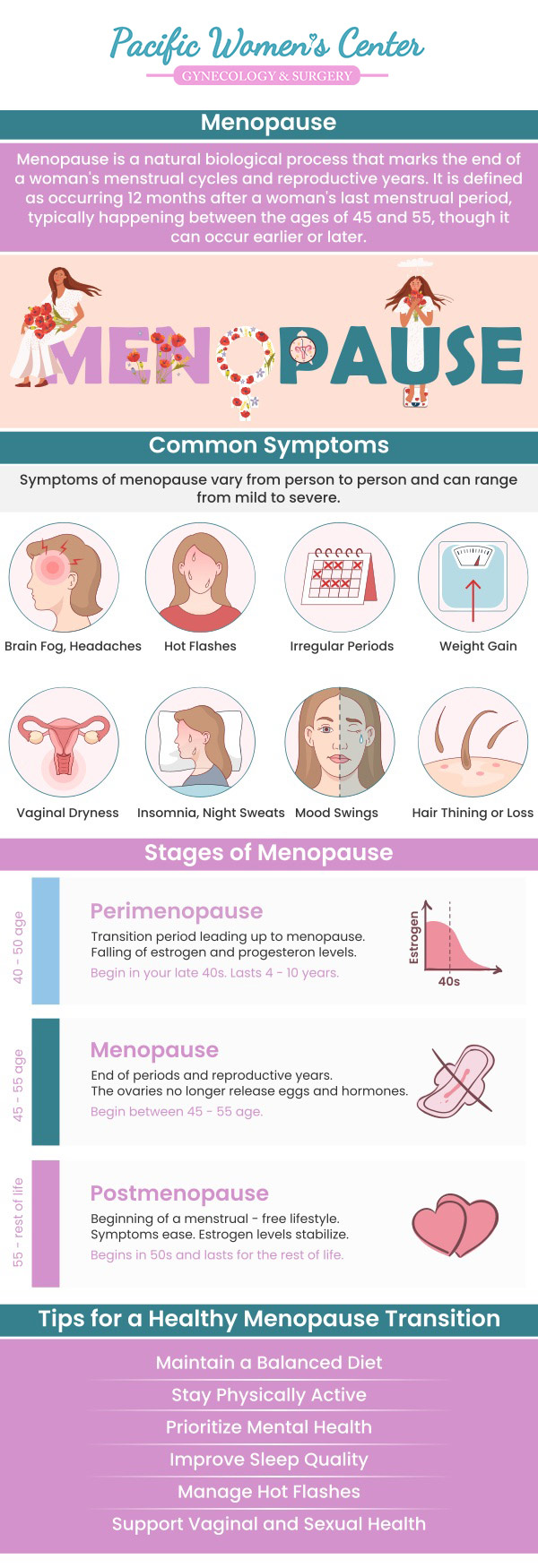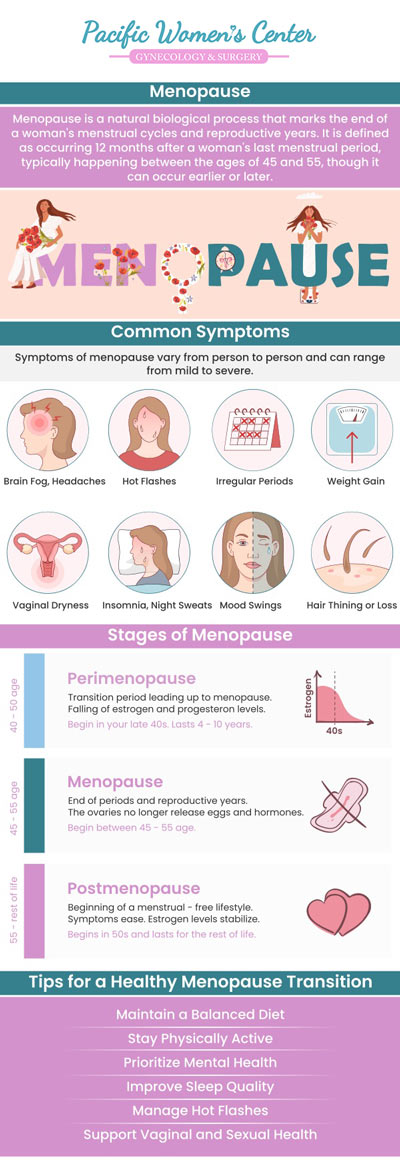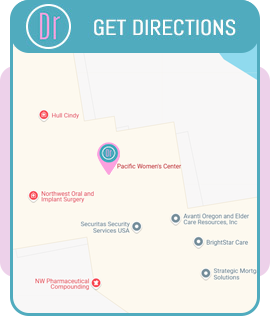Menopause Myths and Facts
At Pacific Women’s Center, our team, including Dr. Richard A. Beyerlein and Dr. Tamara A. Stenshoel, is dedicated to separating menopause myths from facts. We understand that this significant life change is often surrounded by misinformation, from the idea that menopause always causes weight gain to the belief that hot flashes are the only symptom. Our goal is to provide accurate, evidence-based information and personalized care. For more information, contact us or schedule an appointment online. We are located at 911 Country Club Rd. Suite 222 Eugene, OR 97401.


Table of Contents:
Is menopause just about hot flashes?
Does menopause happen suddenly?
Does menopause cause weight gain?
Do all women experience severe menopause symptoms?
At Pacific Women’s Center, we understand that menopause is much more than just hot flashes. Menopause marks the end of a woman’s reproductive years, defined by the absence of menstrual periods for twelve consecutive months, and is accompanied by significant hormonal changes—especially a decline in estrogen and progesterone levels.
While hot flashes are a common concern, menopause can affect many aspects of your health and well-being. You may experience night sweats that disrupt your sleep, mood changes such as increased irritability, anxiety, or depression, and challenges with memory or concentration. Vaginal dryness and discomfort during intercourse are also common, which can impact intimacy and quality of life. Changes in urinary habits, including increased frequency or urgency, may occur as well.
Menopause can also have long-term health effects. Lower estrogen levels increase the risk of osteoporosis, making bones more susceptible to fractures. The risk of cardiovascular disease, including heart disease and stroke, also rises after menopause.
We know that every woman’s journey through menopause is unique. At Pacific Women’s Center, our experienced providers are dedicated to helping you navigate this transition with personalized care and support. From lifestyle recommendations to hormone therapy and other treatment options, we offer a range of solutions to manage bothersome symptoms and protect your long-term health.
At Pacific Women’s Center, we understand that menopause is not a sudden event, but a natural, gradual transition in a woman’s life. This process, known as perimenopause, can begin several years before your final menstrual period. During this stage, hormone levels—especially estrogen and progesterone—fluctuate, often leading to changes in your menstrual cycle and symptoms such as hot flashes, night sweats, and mood changes. Many women notice their periods becoming irregular—shorter, longer, heavier, or lighter—before they eventually stop.
Menopause is officially diagnosed when you have gone twelve consecutive months without a menstrual period, with the average age being around 51. While the transition is typically gradual, some women may experience a more sudden onset if menopause is triggered by certain medical treatments or surgical procedures, such as removal of the ovaries. However, for most women, this is a natural progression that occurs over time.
At Pacific Women’s Center, our experienced providers are here to support you through every stage of this transition. We offer personalized care, guidance, and treatment options to help you manage symptoms and maintain your well-being during perimenopause, menopause, and beyond. If you have questions or concerns about menopause, please contact us to schedule a consultation.
At Pacific Women’s Center, we understand that menopause is a significant life transition for many women, typically occurring between the ages of 45 and 55. While menopause itself does not directly cause weight gain, many women notice changes in their body composition and an increase in weight during this time. These changes are often due to significant hormonal shifts—particularly a decline in estrogen—which can influence how your body stores fat, often leading to increased abdominal fat.
In addition to hormonal changes, the natural slowing of metabolism with age can be accelerated during menopause, making weight gain more likely even if your eating and activity patterns remain the same. Menopause is also associated with a gradual loss of muscle mass, further slowing metabolism and contributing to weight changes.
Lifestyle factors such as decreased physical activity, sleep disturbances, and the stress that can accompany menopause may also play a role. These factors can sometimes lead to overeating or less healthy food choices.
At Pacific Women’s Center, our team recognizes that aging, genetics, and lifestyle habits all contribute to weight changes during menopause. We are here to support you through this transition. Managing weight during menopause is possible through regular physical activity, a balanced diet, adequate sleep, and effective stress management.
At Pacific Women’s Center, we understand that every woman’s experience with menopause is unique. Menopause is a natural stage of life that marks the end of menstrual cycles, and its symptoms can range from barely noticeable to quite disruptive. Some women may experience mild symptoms, such as occasional hot flashes or subtle mood changes, while others may not notice any symptoms at all. However, for some, menopause can bring more intense challenges like frequent hot flashes, night sweats, sleep disturbances, and significant emotional changes.
Several factors—including genetics, overall health, lifestyle choices, and the way menopause occurs (naturally or surgically)—can influence the type and severity of symptoms you might experience. For example, women who enter menopause abruptly due to surgery or at a younger age may notice more pronounced symptoms. Additional risk factors such as smoking, high stress, or certain medical conditions can also impact your menopausal experience.
We believe in personalized care. Our experienced providers are here to help you navigate menopause, whether your symptoms are mild or more severe. If your symptoms begin to interfere with your daily life or well-being, we encourage you to schedule an appointment. Our team offers a range of strategies and treatments tailored to your needs, with the goal of helping you manage symptoms and improve your quality of life during this important transition. For more information, contact us or schedule an appointment online. We are located at 911 Country Club Rd. Suite 222 Eugene, OR 97401. We serve patients from Eugene OR, Springfield OR, Coburg OR, Creswell OR, Cottage Grove OR, Lowell OR, Junction City OR, and surrounding areas.

ADDITIONAL SERVICES YOU MAY NEED
❱ Abdominal Hysterectomy
❱ Bladder Lift Surgeon Q&A
❱ Cervical Cone Biopsy
❱ Colposcopy
❱ Endometrial Ablation
❱ Endometrial Biopsy
❱ Female Sexual Dysfunction
❱ Gynecological Surgery
❱ Gynecology
❱ Hormone Therapy
❱ Vaginal Hysterectomy
❱ Endometriosis Diagnosis & Care



